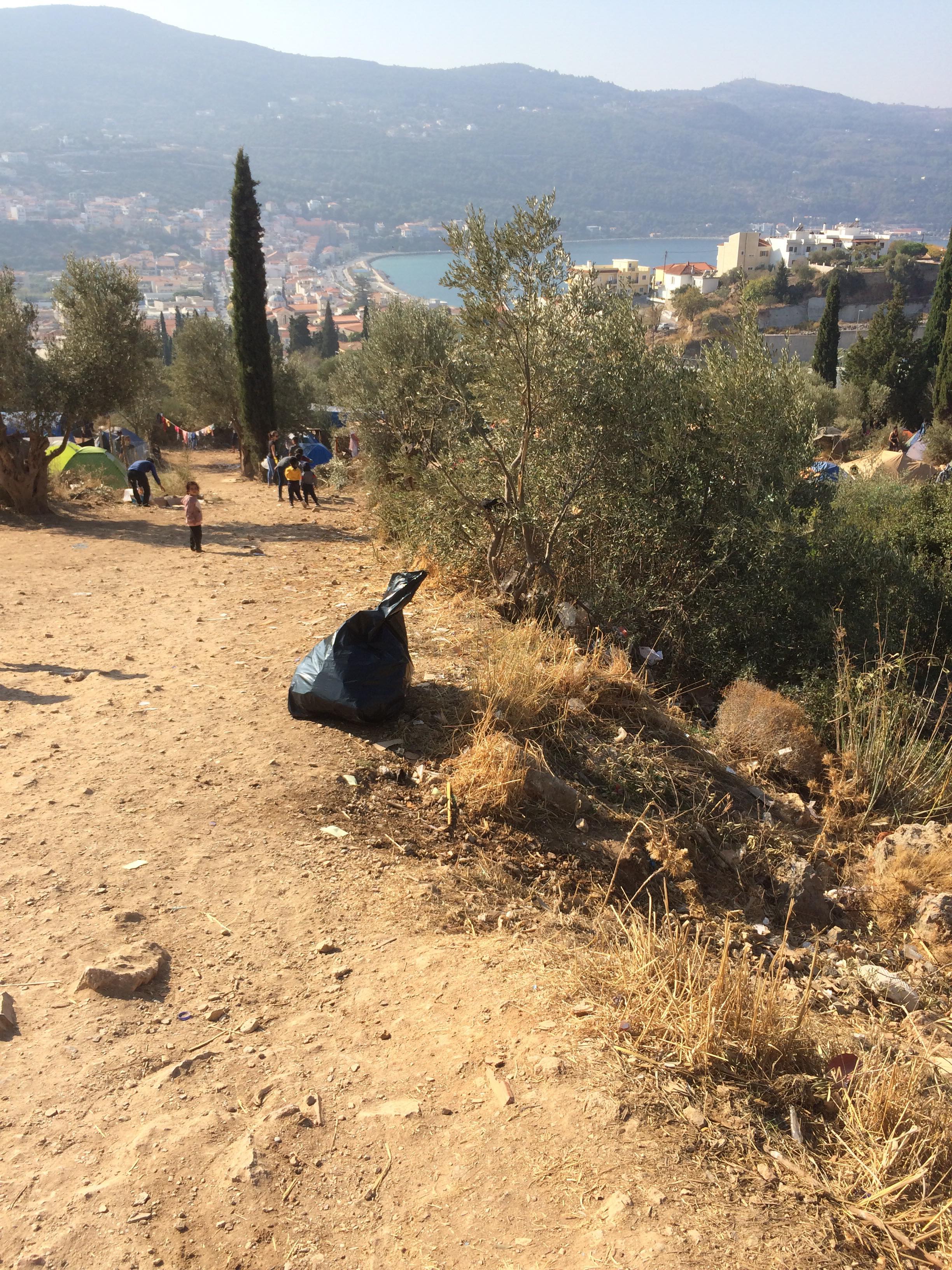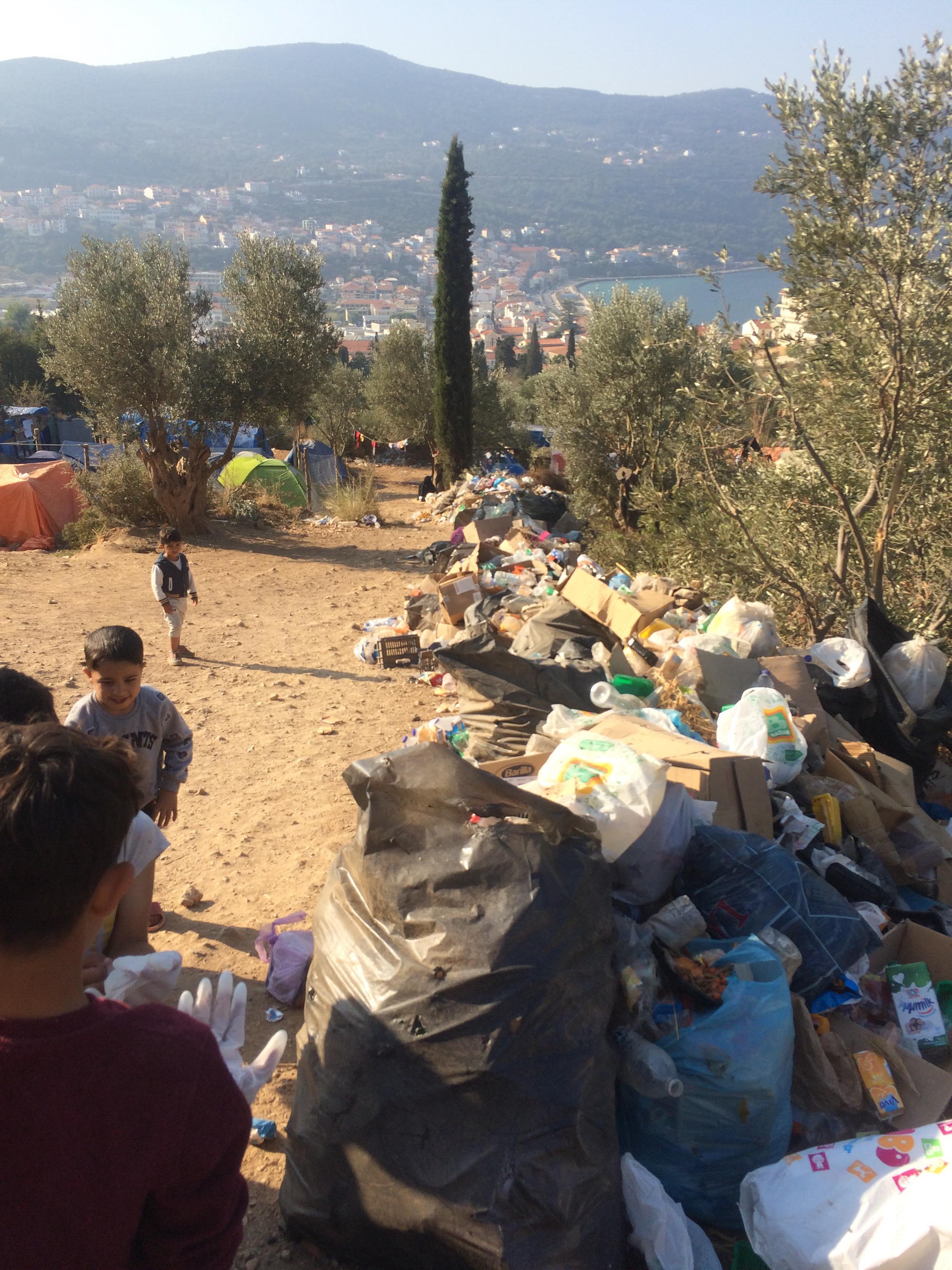Zen and the Art of Camp Clean Up - Alice Cornwell
After teaching at the Alpha Center all week, I asked to be put on “Camp Clean Up” Saturday morning.
A team of five of us met at the Alpha Center at ten to drive up to the camp. Mathilde, from France, brought a sack of black garbage bags and a knapsack full of heavy-duty orange gloves. Her mission this week: to “empower” refugees to take charge. We would spend the first five or ten minutes, she said, rallying people to help.
Operating at four times its official capacity - more crowded than it has ever been - the camp spills out beyond the gates and double-fencing. To either side of the road, there are encampments of tents, many with U.N. blankets sewn together and rigged to provide shade and privacy.
As soon as we arrived here, people gathered. Mathilde asked in French if anyone would like to help. Adam, a man from Togo, whom I’d met at Alpha’s Greek class (amazingly he was wearing a t-shirt with the name of my home town in Massachusetts on the back) took charge. He, along with Patrick, from Cameroon, and John, from Cote d’Ivoire, both regular volunteers from the refugee community, disappeared up among the tents and blankets to see who would help.
Soon, Mathilde had distributed all the gloves and bags and we spread out, picking up: empty plastic water bottles, food containers, food wrappers, tin can tops, bits of cardboard, one or two discarded plugs, a paintbrush, more plastic bottles, bottle tops, cigarette boxes, an old discarded jumper, a pair of underwear, diapers. John and Nina, from London, nearly picked up a scorpion hiding amidst the garbage.
I worked with Adam, cleaning the upper slope. In the past, Samos Volunteers held kids activities here under the olive trees. Now, it’s a maze of tents.
Considering the conditions - people living in flimsy pop-up tents, with cardboard spread on the ground for matting, a few plastic chairs here and there, some kerosene stoves but no electricity or running water - everyone greeted us with smiles and graciousness. Some had cardboard boxes they were using for trash. One man was washing his sneakers in a great lather of soap. A young woman, sitting on a chair rubbing her belly, explained she was three months pregnant. We were speaking a mix of French, Arabic, Farsi, English.
After cleaning the tented area, Patrick, Grace, from Australia, and two other community volunteers ventured up the slope to the toilet area. There are no toilet blocks outside the camp gates and here, among the olive trees, rocks, shrubs and grass, the ground is a thick mess of plastic bottles, toilet paper and sanitary pads. Many of the bottles are filled with urine as women, understandably, are afraid to leave their tents at night.
Picking pieces of toilet paper from the branches of a shrub, overwhelmed by the strong smell of urine, I stood up, saw a small piece of cleared of ground around me, and was suddenly filled with a strange, unexpected sense of peace and oneness.
I turned to Patrick. “Patrick, I feel like the whole hillside is thanking us,” I said. He smiled knowingly. “And the trees.” Patrick studied economics in Cameroon and I know from my English class at Alpha that he’s a talented writer, familiar with the stories of Guy de Maupassant.
“The earth is thanking us,” one of his friends said.
Later, we stood around the six dumpsters, all filled to capacity, tying up black bags, and peeling off the orange gloves to be washed for next week. Mathilde was calculating how much bags and gloves costand whether we might put up signs encouraging people “not to throw trash in nature.” We worried aloud about a possible storm forecast for Samos and imagined how even a small rain could devastate this area, soaking everything and washing all the toilet trash down onto the tents. No one has even provided the refugees here with waterproof tarpaulins.
Nina suggested brining hand sanitizer next week and wondered whether it was OK for kids to help. “I feel like they should be playing,” she said.
“My favorite part was the toilet area,” Grace admitted when I asked. “It felt so refreshing when it was done.”
The next morning, to our surprise, a message popped up on the SV After Hours Group Chat. “Hey Guys. Patrick is down at the waterfront picking up cans. If anyone is up and running and wants to come help, please do. Bring some garbage bags.”
There, along the stone sea wall of Vathy port, Patrick and Ali, another community volunteer from Iraq, were scrambling among the rocks extracting bottles and beer cans. The seawall, like the camp, was a mess. Well, half of it was. They’d cleared the other half. At a hundred cans per bin bag, we calculated that they’d already picked up 10,000 beer cans that morning.
Soon, a handful of Samos volunteers pitched up and other refugees joined in, including Joseph, then two men from Iraq, then two men who’d been enjoying a midday beer by the sea and who’d already promised not to throw their cans.
“Patrick,” someone asked. “What inspired you to do this?”
“I come down here every morning,” Patrick quietly admitted. “I have trouble sleeping.” When alone here in the early morning, picking up garbage, he said he sometimes sings.


